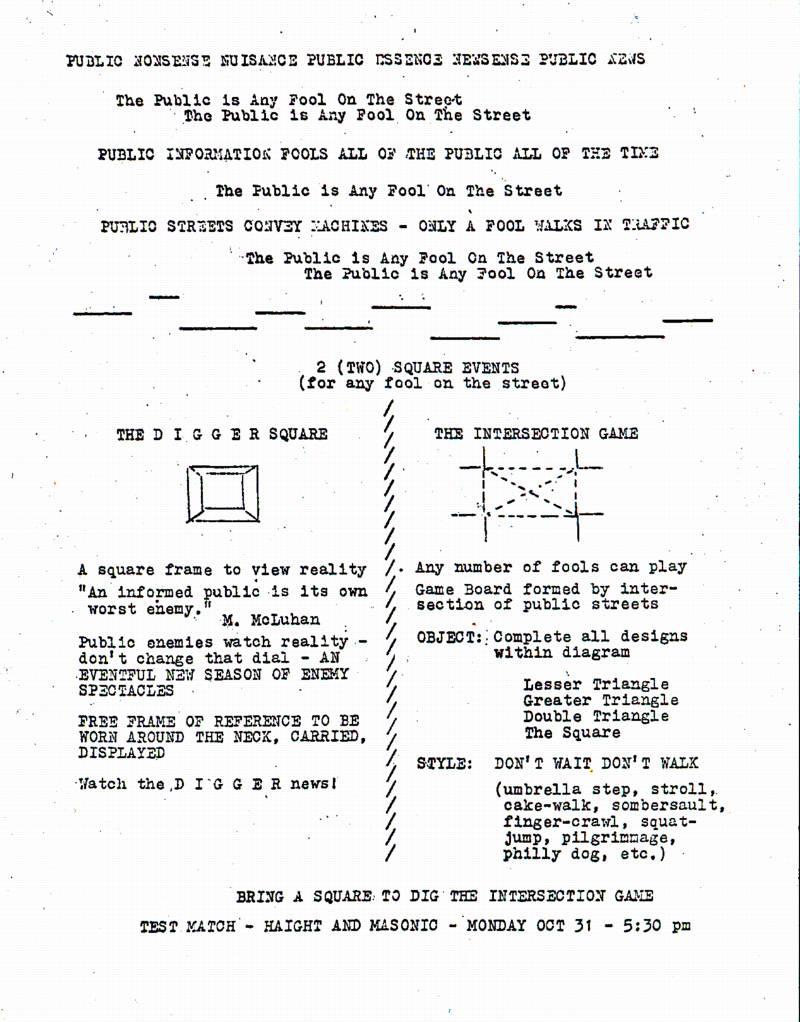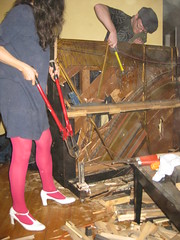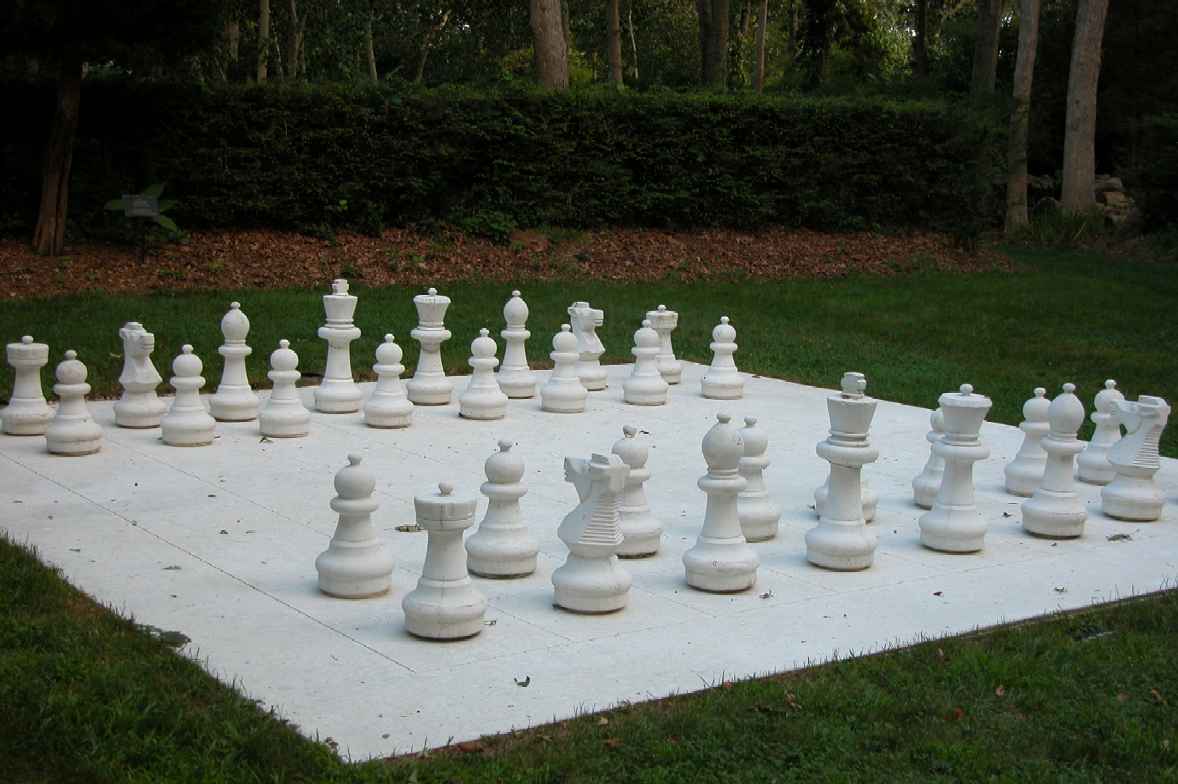
Many Years ago, while somewhat fascinated with Reclaim the Streets and enamored of the more festive forms of direct action that had emerged as part of the "Anti-Globalization Movement", I thought up a great action that could disrupt traffic, reclaim public space, and perhaps teach kids how to disobey the rules in a fun way. I imagined making a flier anonymously that would announce a huge game of hopscotch, foursquare, and a few other classic schoolyard games to take place on a specific day (April 1st maybe?) at a major intersection. The night before I would go and spray paint the squares and circles necessary for these games. My hope was that the day-of there would be spontaneous, decentralized play happening in the middle of a city street. Traffic would stop, kids would take over, and perhaps there would be a new style of non-hierarchel direct action theater in the form of public play.
I never made the fliers or helped stage the event. I look back on it now as a good idea whose moment seems to have passed, for the time being. The kind of action that seems to be resonating with autonomy-minded individuals in North America has shifted out of the streets in many ways. What's brought this up for me now, many years later, is considering how Win-Win games can be direct action political practices. I feel like this is a huge can of worms (one I'm excited about digging into), so I'll start with something from the past.

Many years ago, my friend and source of endless inspiration Sharon Cheslow asked if I'd ever heard of "the Diggers". When I admitted I hadn't she exclaimed "Gabe! I can't believe you've never heard of them. They did it all... everything that we do they did it first!" It turns out she was right in more ways than she realized.


The Diggers, in a nutshell, were the near perfect synthesis of two main strains of 60's counter-culture: the Psychedelic post-beatnik Hip scene and the anarchistic upheaval of the new Left. In a way they were a dream come true; the rarely seen avant-garde artist and activist who embraced both selves fully. They appeared right at the start of the Haight/Ashbury scene of 65-67, emerging from the SF Mime Troupe. Schooled in Artaud, Brecht, Macluhan and LSD they created political street theater out of parades, gave away free food every day, opened a Free Store, put on participatory Be-ins, helped create squats, free hotels, free medical and legal clinics ... basically fought for "FREE" in all of its material, political and spiritual manifestations.
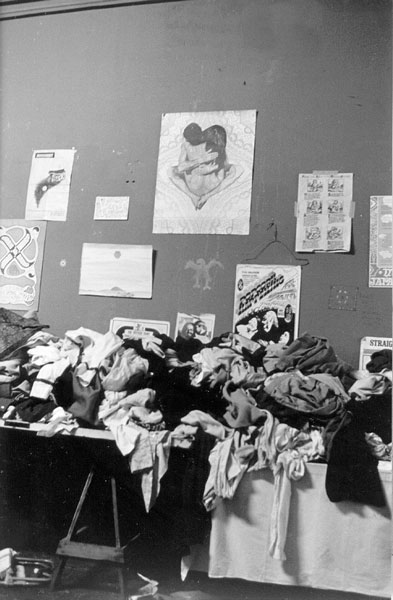
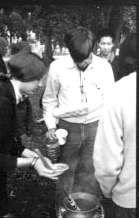
They were also a collossal bummer for just about everyone who had a stake in the Haight/Ashbury. The cops hated them because they had no respect for authority and represented a politically engaged hippy, the Left hated them because they had fun while making a political statement often exposing the tedium of the vertically structured events put on by their Berkeley counterparts; and the Hippies hated them because while everyone else was telling them their scene was groovy, the Diggers were reminding them of the Capitalist exploitation, police violence, rape and drug abuse that was part of the ever prevelant dark side of the "Hashbury". Yet most everyone loved them, or at least respected them. Even the business owners who were endlessly harangued by the Diggers for not just giving away stuff for free embraced them as their "collective conscience."
The Summer of Love in 67 essentially destroyed the Hippie movement, in part by its overwhelming success and popularity, and the old-school Diggers gave up their name and became the Free City Collective. They eventually released a publication (for free) called the Digger Papers that acted as a summation of their written work up to '68 and included a piece called "Post-Competitive, Comparative Game of a Free City". In a sense, modern living was a game that was played, and being a Digger meant playing a new game - a Win-Win game.
Our state of awareness demands that we uplift our efforts from competitive game playing in the underground to the comparative roles of free families in free cities.
We must pool our resources and interact our energies to provide the freedom for our individual activities.
In each city of the world there is a loose competitive underground composed of groups whose aims overlap, conflict, and generally enervate the desired goal of autonomy. By now we all have guns, know how to use them, know our enemy, and are ready to defend. We know that we ain't gonna take no more shit. So it's about time we carried ourselves a little heavier and got down to the business of creating free cities within the urban environments of the western world.
Free Cities are composed of Free Families (e.g., in San Francisco: Diggers, Black Panthers, Provos [substitute "Red Guards" in Ringolevio], Mission Rebels and various revolutionist gangs and communes) who establish and maintain services that provide a base of freedom for autonomous groups to carry out their programs without having to hassle for food, printing facilities, trans- portation, mechanics, money, housing, working space, clothes, ma- chinery, trucks, etc.
At this point in our revolution it is demanded that the families, communes, black organizations and gangs of every city in America coordinate and develop Free Cities where everything that is necessary can be obtained for free by those involved in the various activities of the individual clans.
Every brother and sister should have what they need to do whatever needs to be done.
Like a lot of 60's groups that started out public and social, the Diggers/Free City Collective turned inwards, insular and a bit more paranoid (though justifiably). However, much like other artist/activist groups (the Provos, Situationist International, Black Mask, Yippies, etc) the Diggers left their mark and paved the way for generations of new kinds of games (Food Not Bombs, Critical Mass, Crimethinc., Really Really Free Market, etc.) It's possible, if not probable, that most people performing these new kinds of Win-Win practices have never heard of the Diggers, or don't know just how much of what they're doing was once part of this groups standard practice. For example, I had never heard of this game until just last week...

